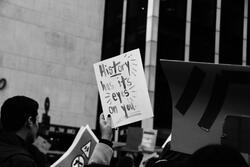Authentic Community Organizing, From Food to Feminism
At the taco shop down the street from my house, Mariana knows my order by heart: California burrito, swap the sour cream for guacamole. Macho’s is my favorite stop for a treif dinner after an evening spent surfing at Ocean Beach. It’s certainly not fine dining, but there’s a special feeling I get when I sit down and recognize all of the other customers—a California seder, if you will.
Living in San Diego, I’ve grown up with a distinct regional identity. It takes me just as long to drive to the Tijuana airport as the San Diego one, and when I travel, I always know I’m home when I step off an airplane and the first language I hear is Spanish. Around here, tacos aren’t restricted to Tuesdays. There’s a unique cultural exchange that I haven’t experienced elsewhere, a give-and-take that enables restaurants like Macho’s to be sandwiched between a Vietnamese-owned nail salon and a Starbucks.
From dining on Mexican-fusion cuisine at Macho’s, to learning about the intersectional practices of San Diego’s large Mexican-Jewish population, my identity has largely been shaped by San Diego’s multiculturalism.
Yet in our globalized world, personal identities are being lost as whole cultures are packaged and shipped en masse. In some cases, this has facilitated positive cultural phenomena; Top Chef contestant Katsuji Tanabe, for example, received critical acclaim for his Los Angeles restaurant MexiKosher, which prepares Mexican flavors according to strict kosher halakhah.
But more often than not, cultural exportation more closely resembles exploitation. Even our president’s Cinco de Mayo tweets equate inauthentic taco bowls with an entire people’s culture and heritage. It’s cultural appropriation, perhaps not by name but by impact. And it’s increasingly contributing to the loss of authenticity as languages, methods, and histories are reduced to the “ethnic foods” aisle of the grocery store.
Culinary traditions aren’t the only things being commodified. From hydroflasks with #feminist stickers to t-shirts proclaiming “The Future is Female™,” when feminist causes are commodified we lose sight of their true meaning in lieu of cheap branding. Feminism is trendy, but rather than exploiting that by producing and consuming goods, we as activists should be using this newfound recognition to call for structural and systemic change.
This kind of change isn’t simple to achieve, and requires hard, unglorified work; grassroots community organizing and multi-generational movements like the inspiring March for Our Lives are a great start. But as important an issue as gun violence is, there are so many causes vying for our attention. As the Parkland students have taught us, movements are most successful when we eschew meaningless mantras for authentic and sustained action.
To truly repair the world, we must approach each problem with an open mind. And, perhaps, an empty stomach doesn’t hurt either.
This piece was written as part of JWA’s Rising Voices Fellowship.








I love this ,Sofi!! Very very well written and an excellent argument.